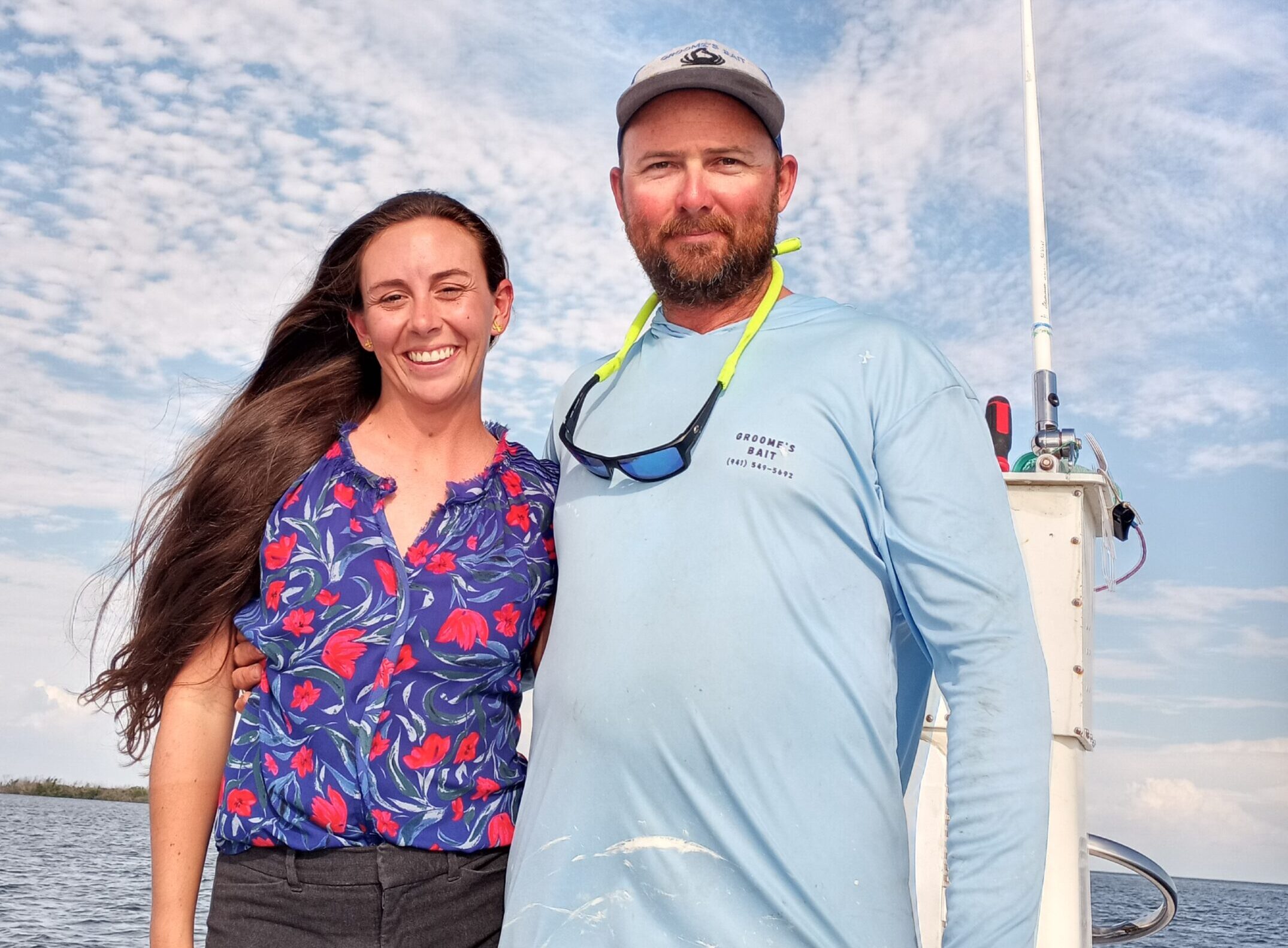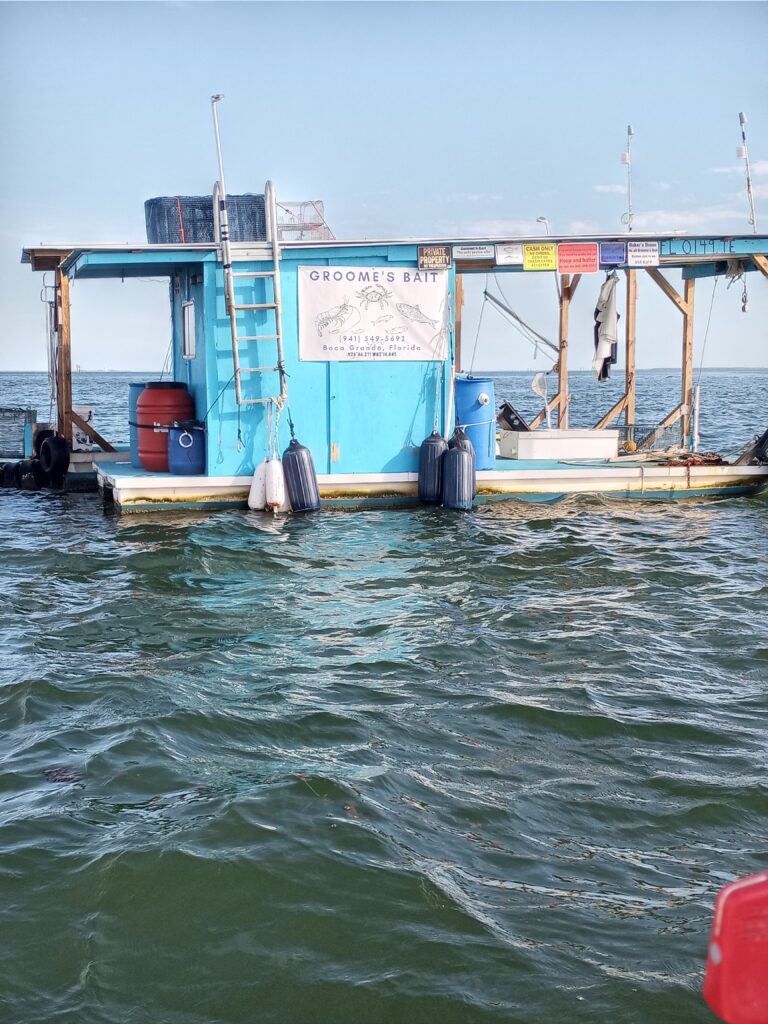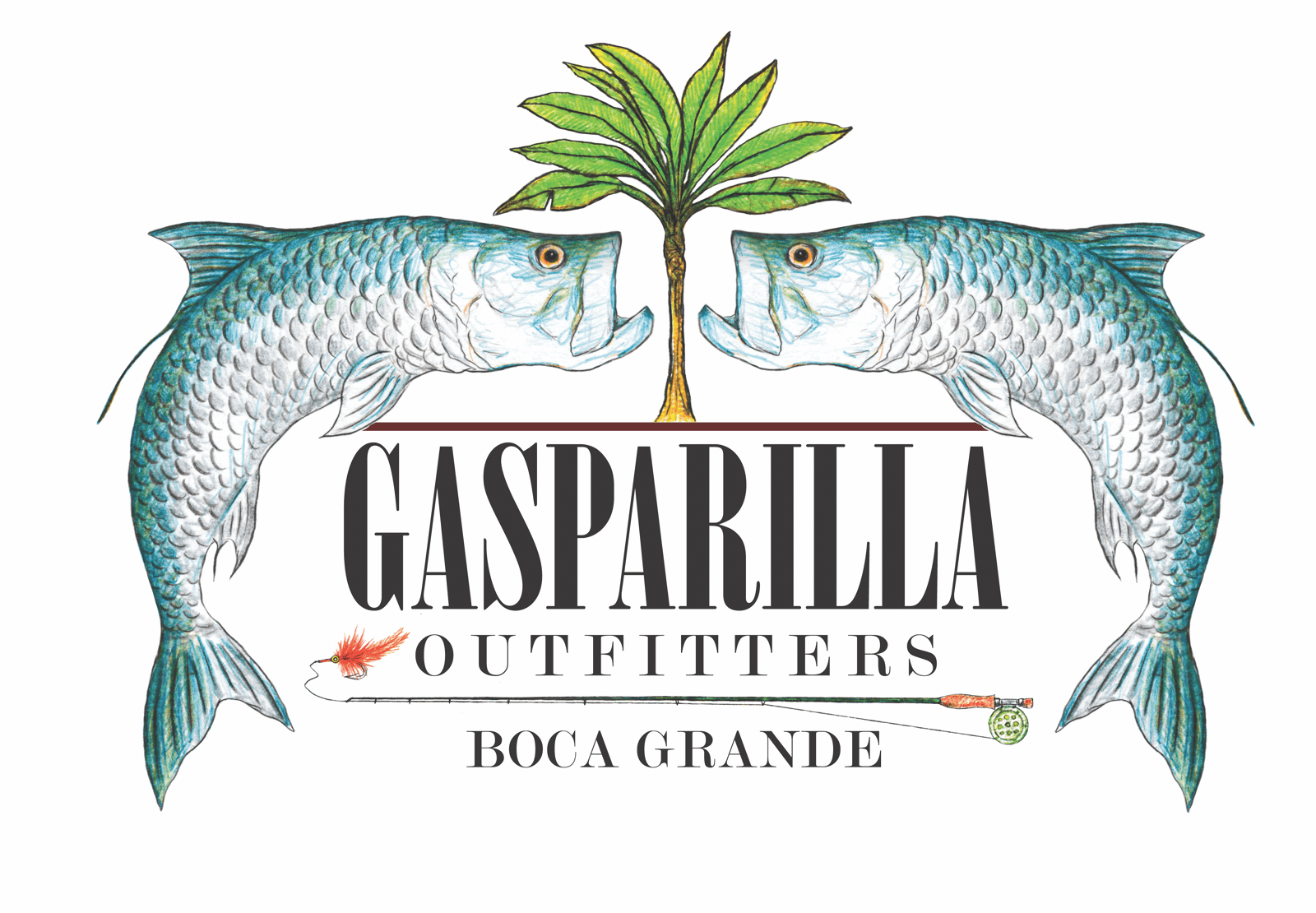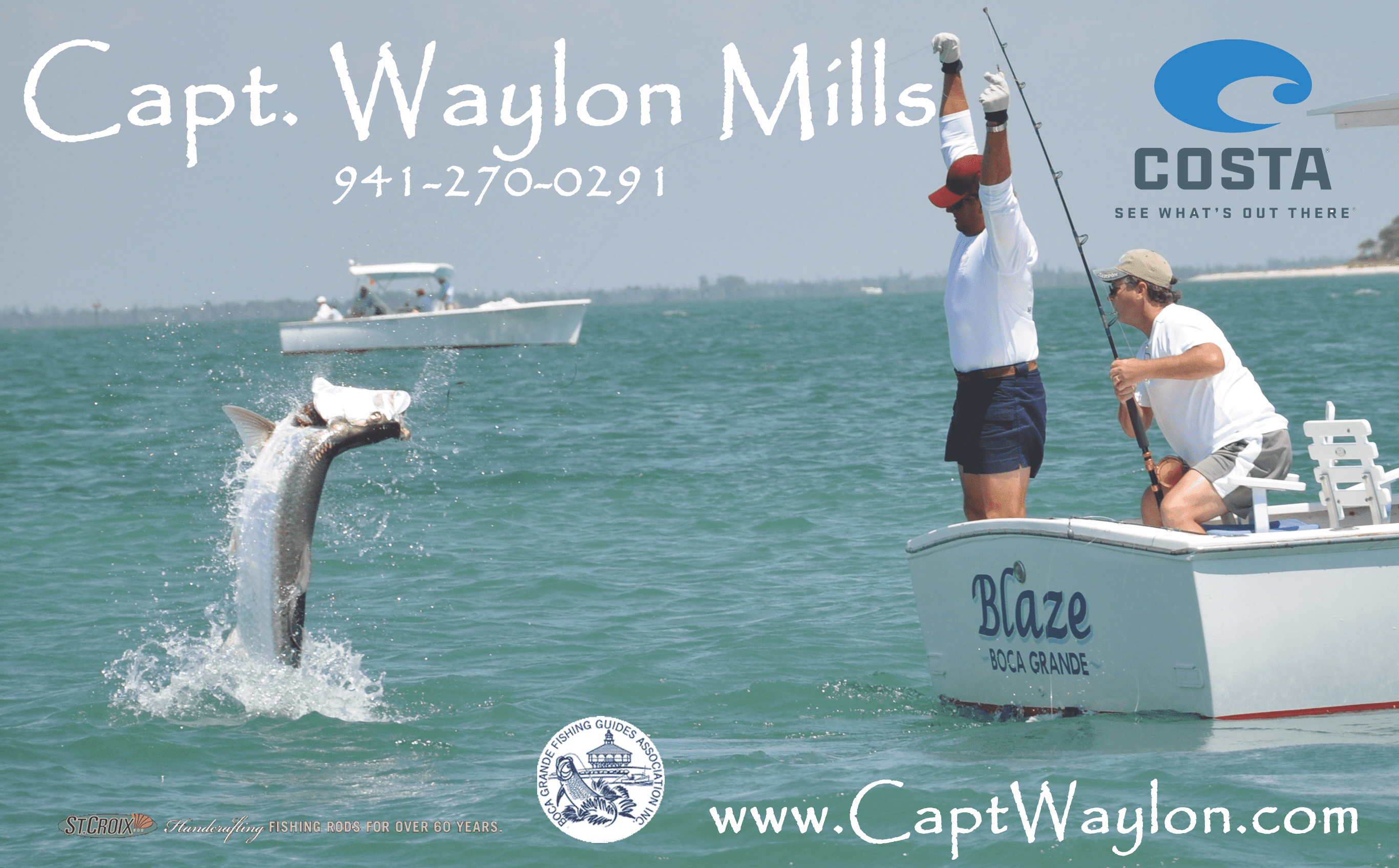IN THE SPOTLIGHT: 24/7 local bait anchored off Three Sisters

There is a synergy between what Nelson Smith Groome IV does and what the fisherpeople of Boca Grande do. One would have a hard time surviving without the other. They certainly would not be as successful without one another. Nelson catches and sells bait during tarpon season in the waters around Boca Grande.
For most of the season, Nelson both works and lives off his boat, anchored among the Three Sisters Islands, just east of Boca Grande. His boat, a pontoon boat with a bright blue and yellow cabin, is his store, his home, his workshop and his livelihood. The wells attached to the side of the boat keep his catch fresh and alive until it finds another home with a captain or a recreational fisher.

Nelson started his Boca Grande business, Groome’s Bait, in 2016 and has become a fixture of the Boca Grande tarpon season ever since.
“Because I’m mainly here for tarpon season, I’ll start in March and I’ll stay out there until August 1, generally,” he said. He finds it easier to stay on the water 24/7.
“The main reason for that is it’s just convenient, and every year in Boca Grande and on Gasparilla Island people get their bait stolen, so I stay out there and make sure no one steals it. And, because I sleep out there, captains or recreational fishermen can stop by and buy bait as early in the morning as they want. Lots of captains are out there 5:30, 5 in the morning and buy bait to go tarpon fishing.”
They must come by boat to buy his bait, which consists mostly of white bait, pinfish and crabs.
“My main bait is crabs,” he said. “Sometimes I’ll catch squirrel fish, too.” He noted that he does not catch or sell baby blue crabs, only pass crabs, both the red-legged type and the purple-legged type.
Nelson had it in his mind to do this type of business since he was a boy. He takes pride in saying he was a “military brat,” growing up with a father who served in the military and then worked for the military. They moved relatively frequently. He grew up in Panama for the first 13 years of his life.
“I remember seeing locals in Panama who caught and sold bait under the Panama Bridge, and I just thought it was a really cool thing they did,” he recalled.
From Panama, the family moved to Germany. They were there three years, and then moved to South Carolina for three years. When Nelson graduated from high school his uncle called him from Florida and asked if he wanted to come down and work on a ranch. It sounded good, so he made the move to Florida. That was 20 years ago.
He worked on the ranch for a number of years, but at one point it was sold to new owners.
“I stayed on the ranch, but then they put me on a front-end loader and I was just pushing up yard debris pretty much for three years,” he said. “I just saw my life going down, sitting on the loader for another 10 years, and I wasn’t happy with that. I wanted a change, so I quit. The first few years were pretty tough, as they usually are whenever you start anything new. But I’m happy I did it.”
He is the only one in the Boca Grande area catching and selling bait in this fashion. He said there are some people doing similar work in Tampa and Miami, but they do not live on their boats. He said they go out in the morning and catch bait, and then come back in and sell it from shore. He is the only one he knows who gives ‘round the clock service.
Does he make a decent living at this work?
“I’m happy with it,” he says without hesitation. “It beats sitting on a loader! I enjoy it. I feel more at home out here on the water than I do at home in the house. I guess I get a little depressed when I get back home, hanging around the house.”
He has found a good solution to his down-time doldrums. He found love. For the last four years, he and Kelsey Chavarria have been a couple. Kelsey is operations lead, assisting with administrative and financial tasks, as well as a patient representative at the Boca Grande Health Clinic. They have a four-legged “kid,” named Luna.
Thanks to Hurricane Ian, they pushed their relationship to a new level and decided to live together in North Port. Kelsey’s apartment was seriously damaged in the hurricane, but Nelson’s was not. They had been talking about living together, but had not made the move yet. Ian pushed them into making it happen. They are very happy with the move.
The story of how they got together shows that laughter and loving are closely connected. Here is Nelson’s version:
“I used to work with Tom Dixon, Tree Trimming, who works out here in Boca Grande. Tom has a very strenuous work routine, and I like cutting up with the guys when we’re working. As we were driving from job to job I would be a little goofy and bark at people’s dogs as we were driving down the road.”
He went on: “So we had the work truck with Tom Dixon Tree Trimming down the side of the truck and the windows were down. As we were driving past the clinic, this gentleman was walking his dog, so I proceeded to bark at it. And then I looked out the other window as I was done barking at this guy’s dog, and there was Kelsey with a very mad look on her face. She was convinced I was barking at her, which I wasn’t. She was saying, ‘Who are you? You crazy person!’ She was walking across the parking lot into her work at the clinic.”
There is more: “So, coincidently, a week or two later, we ended up working, tree trimming, at the Health Clinic. So I walked inside, hot and sweaty from trimming trees, and I told her I had ‘hurtfeelioma,’ and I needed an appointment. She did not give me one. Then I asked if I could take her out for coffee, and she said ‘No.’ So I asked if I could take her to a dog park, and she again said ‘No.’ So then I asked for her phone number, and she gave me her phone number. I asked if it was her real phone number, and she said it was.”

Kelsey said she just needed him to get out, but the number turned out to be the beginning of much more. Four years later they are still together and having fun, laughing, catching bait and making a life.
“We enjoy one another,” Kelsey smiled. “I help him catch bait a lot. I cook for him and bring him food. There is just a little stove out on the big boat, anchored in the harbor.” Nelson rarely barks at dogs these days. He leaves that to Luna.
“I have learned from that,” Nelson admits, referring to the reaction Kelsey initially had to his prank. “That’s not the best way to communicate.” Then he added, “But it actually did work out – since that brought us together.”
When tarpon season is over, Nelson and Kelsey take a couple of weeks to go lobster diving in Miami. Lobster season is several months long, but they like to go early in the season. This year the season starts August 6, and they will be there to catch their limit. These lobster are not for sale, though. They enjoy eating them, themselves.
After lobster diving, Nelson spends time “hanging out,” working on projects, doing some traveling and getting ready for the next season. Anyone who owns a boat knows what that is all about.
“During Hurricane Ian, the big pontoon boat got flipped upside down,” he said. “It got totally trashed. I had to rebuild the whole pontoon boat, the shed. It’s fine. Compared to other people, I think I got off lucky. The house in North Port was fine, and we got to drive the boat around for a week or more up and down the streets. It was all flooded.”
It is that sort of thing the summers are for. Nelson said that the waters around Boca Grande have been very good for him. There has been some issue in the past regarding water quality, especially with red tide, but this year has been free. He suspects that is because there was less rainfall.
“I can tell the pin fish here are bigger,” he said. “It seems like there’s more bait around than usual, but sharks are horrible this year. Everywhere we go there are sharks … a lot of sharks this year.” He does a lot of spear fishing, and he needs to be extra careful of the sharks.
He is not too fond of the “snot grass” in the water this time of year.
He explained it is an algae that is floating in the bay. It mats up, is slimy and sometimes drops to the floor of the water and kills off other plant life. Kelsey said they keep a big calendar and make notes of things that happen during the year and the changes. She said the appearance of snot grass happens around this time every year.
“We notate it because when Nelson throws the net to catch the white bait, the stuff gets stuck in the net and we know it’s going to be a difficult time.” They explained that it can be found in the open water, and then the wind blows it to the shoreline, where it can gather and become quite thick. Nelson added that it often kills out the good sea grasses.
Switching back to the big picture, Nelson acknowledged: “It is definitely a very different lifestyle.” He is 38 and has no problem with being different.
He admits his brain “gets fried” out there in the sun sometimes.
“There will be times you are working two days straight with no sleep, and you get tired. But it’s part of it; no big deal. I do get a little grouchy, I guess. I’m told I get a little grouchy after little sleep.” Kelsey just smiled.
Despite the challenges, he enjoys his place in Boca Grande. He said he has made a lot of good friendships with the fishing population of Boca Grande.
“They stop by and we talk and become friends,” he said. “We are interested in one another, and talk to one another. We check in with each other and see what’s going on with the fish or the bait. Everybody’s been great out here. I haven’t had any bad experience from anybody in Boca Grande, they’ve always been really nice.”
This year, Nelson sees the tarpon season getting started a little slower.
“We’ve had colder weather,” he noted, “and it’s been super windy. This last two months have been just crazy wind. A lot of wind. Obviously, a lot of the captains are complaining because they can’t go fishing in 30 mile-an-hour winds. It’s no fun for the clients, the recreational guys don’t like fishing in that, either. You just get beat up. So you’re not selling bait if nobody’s fishing. But it’s part of the gig. It’s fine, no big deal. I’m not sweating it.”









